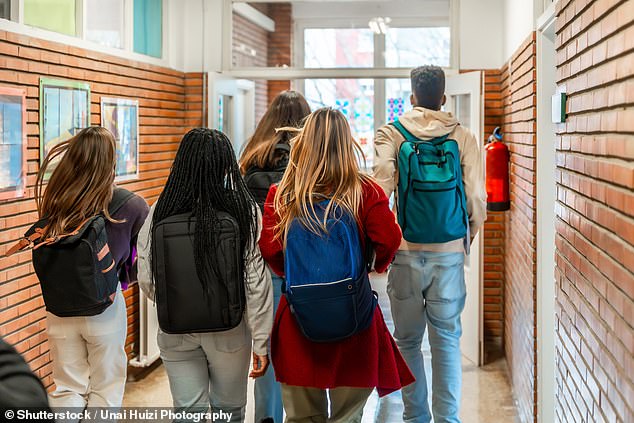Covid lockdowns set adolescents back in their schoolwork and led to the worst exam results in math and reading on record.
Now, researchers warn they may have also taken a toll on sex education, leaving middle and high schoolers less confident about safe practices and more vulnerable to dangerous diseases.
Scientists at Brown University found that seventh graders, who are typically 12- to 13-years-old, who received sexual education in 2023 to 2024 (after pandemic school closures) were more likely to have negative feelings or beliefs around the topic compared to those taught in 2018 to 2019 (before pandemic school closures).
Results showed, however, that both groups did show interest in the topic.
Parker Haddock, the medical student who led the research, said: ‘Middle schoolers are learning the facts about sexual health, but that’s only half of the battle.
‘If we want students to make healthy choices, we need to teach sexual health in ways that foster not just knowledge, but belief and confidence, and result in real-world application.’
Adolescents are at a disproportionately higher risk of experiencing sexually transmitted diseases (STDs), unwanted pregnancies or unhealthy relationships than their older peers because they are more likely to engage in risk-taking behaviors.
And there has been a recent shift in adolescent sexual behavior, with surveys suggesting condom use has been on the decline.

Scientists are raising concerns about the impact of Covid lockdowns on sexual education (stock image)
A 2023 World Health Organization study on 41 countries found that among sexually active 15-year-old boys, 61 percent reported using a condom at last intercourse in 2022 compared to 70 percent in 2014.
For girls of the same age, 57 percent reported using a condom at last intercourse compared to 63 percent in 2022.
And while across the US, the number of STD infections has fallen annually, CDC data showed that for adolescent males aged 15 to 19 in 2023, the latest date available, the number diagnosed with chlamydia, the most common STD in the US, rose 3.2 percent.
For the recent study, the students completed an eight-lesson sexual education program and then filled in a survey on their experience.
Two different classes completed the survey. One during the in 2018 to 2019 school year, and a second for the 2023-2024 year.
The researchers said the results were yet more evidence that children needed to be taught in classrooms for their emotional and social learning skills.
During Covid lockdowns, when sexual education shifted to virtual-only, educators saw a few pluses, such as virtual anonymity increasing engagement.
But they also warned it led to a lack of access to vital resources, while virtual classes made it unclear how many of the students were engaging with the lessons.
The research was revealed as an abstract ahead of its presentation at the American Academy of Pediatrics 2025 National Conference and Exhibition at the Colorado Convention Center on Sunday. It was not clear whether it had been peer-reviewed.
No further details were provided, including in which state the sexual education classes were undertaken, what course the children completed or what questions they were given to answer.
Daily Mail contacted the researchers ahead of the publication of this story for more details, but did not receive a reply.
Additionally, the study was part-funded by the Family Medicine Health Resources and Services Administration (HRSA) and The Warren Alpert Medical School Student Senate Funding Board.
Haddock added: ‘Sexual health curriculum needs to evolve so it can meet students where they are at and give them the tools they will need.’
Sexual education is seen as an essential part of the curriculum in many areas, teaching children about the risks from STDs, HIV, safe sex practices, puberty, anatomy and healthy relationships.
Experts say it can boost contraceptive use, delay sexual activity, slash risky sexual behaviors and reduce the risk of unintended pregnancies.
But critics argue that the topic should be the responsibility of parents, not schools, while others fear it may promote sexual activity, rather than discourage it.
Sexual education is split by states in America, with only 32 requiring sexual education, while 34 mandate school instruction about HIV.
About 31 states also mandate instruction on child abuse prevention.
Sexual education is broadly popular among parents, however, with a 2025 nationwide Planned Parenthood survey finding that 84 percent of parents supported the education in middle school and 96 percent support it for children in high school.
Surveys suggest that young adults aged 18 to 30 years old are now having less sex than ever, with a 2023 survey finding that one in four people in Generation Z had not had sexual intercourse.
Members of the generation report they are avoiding sex over fears of sexually transmitted infections, of being judged or criticized and anxiety about the potential consequences.
This article was originally published by a www.dailymail.co.uk . Read the Original article here. .

